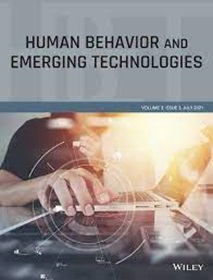Professional Digital Competence: Definition, Frameworks, Measurement, and Gender Differences: A Systematic Literature Review
IF 4.3
Q1 PSYCHOLOGY, MULTIDISCIPLINARY
引用次数: 0
Abstract
In the current context of increasing digitization, professionals need to be digitally competent. In addition, women’s low participation in the technology field indicates the persistence of a digital gender gap in the economic and social spheres. A key aspect to help reducing digital inequality is the role that the digital competence (DC) plays in the professional development of women, allowing them to enter to a job market still coped by men. The current systematic literature review, following the PRISMA protocol, analyzes the existing definitions of professional DC, the frameworks used to develop it at the workplace, and the gender differences observed. Four main ideas emerge from the review of the 41 selected articles: (1) the need of an enabling professional DC definition to help understand how it operates specifically in professional environments; (2) the expanding role of the DigComp framework to carry out initiatives for assessing, training, developing, advising, or certifying digital competence in professional environments; (3) the identification of seven key dimensions of professional DC; and (4) the need of future studies that go further in the measurement of women’s professional DC, as a response of the lack of data about gender differences in this field. Although the limitations of a systematic literature review, such as publications and database bias, these results are aimed at fostering a shared definition and framework of professional DC that standardizes the measurement and development of this competence, allowing workers, and women in particular, to adapt to the digital transformation, assuring equal access to qualified jobs.专业数位能力:定义、架构、测量与性别差异:系统性文献回顾
在当前日益数字化的背景下,专业人员需要具备数字化能力。此外,女性在技术领域的低参与度表明,经济和社会领域的数字性别差距持续存在。帮助减少数字不平等的一个关键方面是数字能力(DC)在女性职业发展中的作用,使她们能够进入仍然由男性主导的就业市场。目前的系统文献综述,遵循PRISMA协议,分析了专业DC的现有定义,用于在工作场所发展它的框架,以及观察到的性别差异。对41篇精选文章的回顾产生了四个主要观点:(1)需要一个专业的数据中心定义,以帮助理解它如何在专业环境中具体运作;(2) DigComp框架在专业环境中开展评估、培训、发展、建议或认证数字能力的举措方面的作用不断扩大;(3)专业数据中心七个关键维度的识别;(4)由于该领域缺乏性别差异的数据,未来需要进一步研究女性职业DC的测量。尽管系统性文献综述存在局限性,如出版物和数据库偏差,但这些结果旨在促进专业数据中心的共享定义和框架,使这一能力的衡量和发展标准化,使工人,特别是妇女能够适应数字化转型,确保平等获得合格工作。
本文章由计算机程序翻译,如有差异,请以英文原文为准。
求助全文
约1分钟内获得全文
求助全文
来源期刊

Human Behavior and Emerging Technologies
Social Sciences-Social Sciences (all)
CiteScore
17.20
自引率
8.70%
发文量
73
期刊介绍:
Human Behavior and Emerging Technologies is an interdisciplinary journal dedicated to publishing high-impact research that enhances understanding of the complex interactions between diverse human behavior and emerging digital technologies.
 求助内容:
求助内容: 应助结果提醒方式:
应助结果提醒方式:


